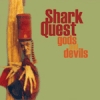 It's rare that a group of musicians can start crafting a score for a movie about a famed clay animator, braving new territory musically in the process, and end up with an album that transcends every move they've made in the past. That it comes from Shark Quest is no real surprise, as they've been wowing audiences in/outside of their native North Carolina towns for almost a decade. The resulting music is an amalgamation of styles and features the band's first use with piano, synthesizers, and various types of unique percussion.
It's rare that a group of musicians can start crafting a score for a movie about a famed clay animator, braving new territory musically in the process, and end up with an album that transcends every move they've made in the past. That it comes from Shark Quest is no real surprise, as they've been wowing audiences in/outside of their native North Carolina towns for almost a decade. The resulting music is an amalgamation of styles and features the band's first use with piano, synthesizers, and various types of unique percussion.
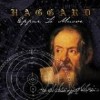 Despite a rich history dictating otherwise, the average music listeneris likely to express shock or, depending on the snobbery of saidlistener, outrage at the idea that classical compositions andtraditional metal are perfect compliments to each other. For nearly twodecades, most of metal's finest have at one time or another employedthe services of forward thinking conductors (and vice versa, anyoneremember the ballet scored by Entombed?) or, at the very least, broughta keyboardist on board in the attempt to simulate a string section. Andthen there is Haggard, one of the largest "bands" on the planetclocking in at just fewer than 20 full-time, classically trainedmembers and a vast roster of recurrent guest musicians assembled tobring the two worlds together like no other. On Eppur Si Muove, thecollective's fourth full-length in ten years, founder and mastermindAsis Nasseri and company have once again managed to combineconventional Northern European folk, galloping melodic metal, andoperatic themes to extraordinary effect. To accommodate the Galileanmotif (which almost explains the absurd art), Italian imagery andbaroque orchestration are prevalent throughout the album. Theirdedication to this is such that some pieces are sung in Italian,bringing the languages represented to four, including the group'snative German, Latin, and English. While logic might dictate that theextensive ground which Haggard traverse over the course of one albumwould sacrifice cohesion, this couldn't be more from the truthconsidering this is a band that has made a career out of it. The firsttrack, "All´inizio è La Morte," is as good a demonstration of this asany. Opening with a Latin choral/classical arrangement and gruff Germanvocals, the song explores more placid territory before crunchy electricguitars and Asis' menacing growl are introduced, only to give way to asoaring Soprano and lush strings, all of which are brought back intothe mix for a climax rarely found in single eight minute tracks. Whileit would take far more space than provided here to explore theintricacies of each of the other eight tracks, suffice it to say thesame level of complexity exists throughout this juggernaut.
Despite a rich history dictating otherwise, the average music listeneris likely to express shock or, depending on the snobbery of saidlistener, outrage at the idea that classical compositions andtraditional metal are perfect compliments to each other. For nearly twodecades, most of metal's finest have at one time or another employedthe services of forward thinking conductors (and vice versa, anyoneremember the ballet scored by Entombed?) or, at the very least, broughta keyboardist on board in the attempt to simulate a string section. Andthen there is Haggard, one of the largest "bands" on the planetclocking in at just fewer than 20 full-time, classically trainedmembers and a vast roster of recurrent guest musicians assembled tobring the two worlds together like no other. On Eppur Si Muove, thecollective's fourth full-length in ten years, founder and mastermindAsis Nasseri and company have once again managed to combineconventional Northern European folk, galloping melodic metal, andoperatic themes to extraordinary effect. To accommodate the Galileanmotif (which almost explains the absurd art), Italian imagery andbaroque orchestration are prevalent throughout the album. Theirdedication to this is such that some pieces are sung in Italian,bringing the languages represented to four, including the group'snative German, Latin, and English. While logic might dictate that theextensive ground which Haggard traverse over the course of one albumwould sacrifice cohesion, this couldn't be more from the truthconsidering this is a band that has made a career out of it. The firsttrack, "All´inizio è La Morte," is as good a demonstration of this asany. Opening with a Latin choral/classical arrangement and gruff Germanvocals, the song explores more placid territory before crunchy electricguitars and Asis' menacing growl are introduced, only to give way to asoaring Soprano and lush strings, all of which are brought back intothe mix for a climax rarely found in single eight minute tracks. Whileit would take far more space than provided here to explore theintricacies of each of the other eight tracks, suffice it to say thesame level of complexity exists throughout this juggernaut.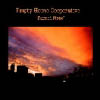 EHC started, essentially, as a casual outlet for an undefined number of active, Boston-area musicians. Boasting current and former members of the Thalia Zedek band, Willard Grant Conspiracy, The New Year, Molasses, and even Godspeed You Black Emperor, EHC enjoyed a humble genesis, organizing around brunch dates at the home of central member David Michael Curry. Since 1997, the group has attracted over 30 contributors in the creation of moody, improvisational music that bridges the gap between the potent emotional directness of its parent groups and the recklessness and vulnerability of the live setting.
EHC started, essentially, as a casual outlet for an undefined number of active, Boston-area musicians. Boasting current and former members of the Thalia Zedek band, Willard Grant Conspiracy, The New Year, Molasses, and even Godspeed You Black Emperor, EHC enjoyed a humble genesis, organizing around brunch dates at the home of central member David Michael Curry. Since 1997, the group has attracted over 30 contributors in the creation of moody, improvisational music that bridges the gap between the potent emotional directness of its parent groups and the recklessness and vulnerability of the live setting.
 In a just world David Thrussell would be one of Hollywood's top paidfilm score composers. In our world, however, he remains confined torelative obscurity, although he has several musical projects operatingconcurrently. His latest solo album as Black Lung, The Grand Chessboard, could easily be the soundtrack to a science fiction film. Although he often addresses social and political topics directly in hislyrics, this time Thrussell has chosen to present political issues onlyin the liner notes (in the form of several quotations dealing withAmerica's place in the overall global structure, from the book "TheGrand Chessboard" by Zbigniew Brzezinski). By making an instrumentalalbum, he has allowed the music to be timeless. It would have been easyto use samples of speeches made by world leaders, or other obviousreference points. Thrussell seems to understand that issues he hasaddressed in the past, such as Capitalism and vegetarianism, areongoing issues, and therefore music which deals with these topicsdirectly won't sound dated ten years from its creation. However, if hehad referenced the problems in today's global structure within themusic directly, it may have reduced the life span of the album.Musically, most of the album is based around repetitive, heavy,danceable rhythms, although there are abstract, beat-less sections,such as the last two minutes of "Despotic Heroic Diversion." Thrussellholds my interest, however, with the multitude of sounds and texturesthat he places on top of the beats. The music sounds linear instructure, yet it is constantly changing. During "Sickly SeratoninSqueeze," patterns shift and electronic sounds ooze out from all placeswithin the stereo field, while a constant 4/4 techno beat propels thetrack forward. The male and female choir voices used on "NeitherDominion Nor Exclusion" reveal that Thrussell has a wider range ofinfluences than most electronic producers. These voices bring to mindboth Greek theatre productions and the exotica of Les Baxter and MartinDenny. After almost five minutes of industrial techno beats, the last30 seconds of "The Multiple Contest" give way to percussion samplesthat recall Jerry Goldsmith's soundtrack to "Planet of the Apes". At 51minutes, The Grand Chessboard is just the right length to holdmy interest for its entire duration. Thrussell resists the temptationto fill the compact disc's 80 minute capacity. Instead he has presentedhis ideas in a concise ten tracks which are at once forward-thinkingand highly enjoyable to listen to.
In a just world David Thrussell would be one of Hollywood's top paidfilm score composers. In our world, however, he remains confined torelative obscurity, although he has several musical projects operatingconcurrently. His latest solo album as Black Lung, The Grand Chessboard, could easily be the soundtrack to a science fiction film. Although he often addresses social and political topics directly in hislyrics, this time Thrussell has chosen to present political issues onlyin the liner notes (in the form of several quotations dealing withAmerica's place in the overall global structure, from the book "TheGrand Chessboard" by Zbigniew Brzezinski). By making an instrumentalalbum, he has allowed the music to be timeless. It would have been easyto use samples of speeches made by world leaders, or other obviousreference points. Thrussell seems to understand that issues he hasaddressed in the past, such as Capitalism and vegetarianism, areongoing issues, and therefore music which deals with these topicsdirectly won't sound dated ten years from its creation. However, if hehad referenced the problems in today's global structure within themusic directly, it may have reduced the life span of the album.Musically, most of the album is based around repetitive, heavy,danceable rhythms, although there are abstract, beat-less sections,such as the last two minutes of "Despotic Heroic Diversion." Thrussellholds my interest, however, with the multitude of sounds and texturesthat he places on top of the beats. The music sounds linear instructure, yet it is constantly changing. During "Sickly SeratoninSqueeze," patterns shift and electronic sounds ooze out from all placeswithin the stereo field, while a constant 4/4 techno beat propels thetrack forward. The male and female choir voices used on "NeitherDominion Nor Exclusion" reveal that Thrussell has a wider range ofinfluences than most electronic producers. These voices bring to mindboth Greek theatre productions and the exotica of Les Baxter and MartinDenny. After almost five minutes of industrial techno beats, the last30 seconds of "The Multiple Contest" give way to percussion samplesthat recall Jerry Goldsmith's soundtrack to "Planet of the Apes". At 51minutes, The Grand Chessboard is just the right length to holdmy interest for its entire duration. Thrussell resists the temptationto fill the compact disc's 80 minute capacity. Instead he has presentedhis ideas in a concise ten tracks which are at once forward-thinkingand highly enjoyable to listen to.  Pure Trash's one flaw as an album is its lack of continuity.Despite attempts to reel it in, Dosh does let his emotions ebb and flowspontaneously, and the result is that his music takes an almostJoycian, stream of consciousness feel in their meanderings. Dosh keepsbetter focus on the outpouring of emotion that serves as his responseto Bill Cosby's Fatherhood, the EP Naoise. Named afterDosh's newborn son and created as a response to his conception, time inthe womb and eventual birth, the seven track disc includes remixes of"Naoise" and "Rock it to the next episode," two of the highlights from Pure Trash,as well as two live performances. One of which, "Contractions," is adelightful gem (though this reviewer allows it might not have been sofor Dosh's wife) that is as good as anything that Dosh has done.
Pure Trash's one flaw as an album is its lack of continuity.Despite attempts to reel it in, Dosh does let his emotions ebb and flowspontaneously, and the result is that his music takes an almostJoycian, stream of consciousness feel in their meanderings. Dosh keepsbetter focus on the outpouring of emotion that serves as his responseto Bill Cosby's Fatherhood, the EP Naoise. Named afterDosh's newborn son and created as a response to his conception, time inthe womb and eventual birth, the seven track disc includes remixes of"Naoise" and "Rock it to the next episode," two of the highlights from Pure Trash,as well as two live performances. One of which, "Contractions," is adelightful gem (though this reviewer allows it might not have been sofor Dosh's wife) that is as good as anything that Dosh has done.  Fog drummer and Minneapolis native Martin Dosh invites us in for yet another foray into his personal life on Pure Trash, the followup to 2003's Dosh (both on Anticon). Using the same formula that made Doshso inviting—a drum kit, a deliberately broken Fender Rhodes and an armyof samples, some chaotic, some organic, others adulterated by effectspedals, all filtered onto a basic eight track recorder—Dosh waxesinstrumental over twelve tracks about marriage, childbirth and thelarceny of the aforementioned beloved electric piano. The onlyvocalizations are the occasional sample from Dosh's wife andco-procreationist (whose assertion that "being pregnant and having ababy is not weird" opens up the album), his new son Naoise (who lendshis name to the ninth track and a more or less complementary EP), orthe gaggle of schoolchildren that Dosh teaches at his day job. Dosh'smusic, emotional as it is, thrives on a blend of subtlety and orderover spontaneity, using his careful choice of instrumentation to conveyemotion, whether it is mourning for his stolen Fender Rhodes (the fifthtrack, "Bye Rhodsy," is such an elegy) or dwelling upon marriage (thesurprisingly mournful but eventually uplifting sixth track,appropriately titled "I think I'm getting married"). Through his music,one can almost see and feel Dosh worry, love, laugh and cry. The resultis genuinely touching and thoughtful, without ever bordering ontriteness or over-sentimentality, quite a feat with such personalmaterial.
Fog drummer and Minneapolis native Martin Dosh invites us in for yet another foray into his personal life on Pure Trash, the followup to 2003's Dosh (both on Anticon). Using the same formula that made Doshso inviting—a drum kit, a deliberately broken Fender Rhodes and an armyof samples, some chaotic, some organic, others adulterated by effectspedals, all filtered onto a basic eight track recorder—Dosh waxesinstrumental over twelve tracks about marriage, childbirth and thelarceny of the aforementioned beloved electric piano. The onlyvocalizations are the occasional sample from Dosh's wife andco-procreationist (whose assertion that "being pregnant and having ababy is not weird" opens up the album), his new son Naoise (who lendshis name to the ninth track and a more or less complementary EP), orthe gaggle of schoolchildren that Dosh teaches at his day job. Dosh'smusic, emotional as it is, thrives on a blend of subtlety and orderover spontaneity, using his careful choice of instrumentation to conveyemotion, whether it is mourning for his stolen Fender Rhodes (the fifthtrack, "Bye Rhodsy," is such an elegy) or dwelling upon marriage (thesurprisingly mournful but eventually uplifting sixth track,appropriately titled "I think I'm getting married"). Through his music,one can almost see and feel Dosh worry, love, laugh and cry. The resultis genuinely touching and thoughtful, without ever bordering ontriteness or over-sentimentality, quite a feat with such personalmaterial.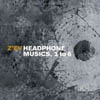 For this latest release, Z'ev entirely forgoes his familiar percussiveexperimentation in favor of a six-part cycle of tape music. It'sentitled Headphone Musics,and Z'ev seems pretty serious about the title, as he includes a ratherpetulant warning for reviewers: "If you can't be bothered to listen tothis music using headphones, please don't bother to write about it."Okay, point taken. I'm not one to disobey a direct order, so I madesure to listen on my most expensive pair of headphones. The six piecesare all between seven and nine minutes long, each one a densearchitecture of multilayered sound drawn from Z'ev's vast archive oftapes amassed over the last 30 years. Z'ev's website(http://www.rhythmajik.com/) gives extensive details on the sourcerecordings and other elements that went into the making of each track,and while it's all very interesting, I'm not sure it changes thelistening experience in any profound way. Many of these sounds havebeen slowed-down and sped-up, rendering them unrecognizable in thedensely populated mixdown of each track. What comes through on each ofthese pieces is Z'ev's unique ear for harmonics and atmosphere, deftlycombining disparate elements into walls of amorphously beautiful sound.For those who can stand this sort of thing, Headphone Musics isone of the better albums of tape manipulation to see release in recentyears, from the standpoint of the average, non-academically mindedlistener. Though most musique concrête composers have begun toincorporate digital production techniques into their repertoire, Z'evchooses to retain the purity of classic tape editing techniques, whichgives the music a warmer analog feel, with plenty of hiss anddistortion. Track one utilizes various recordings of dripping andrunning water to create a dark, immersive environment that envelops thelistener. The time-stretched croaks of Balinese tree frogs are layeredto hypnotic effect on the second track, which plays like a fieldrecording from an as-yet-undiscovered subterranean jungle. Track fourwas my favorite, drawn from various obscure sources, most notably thesinging of a shaman from a now-extinct tribe of Malaccan Indians. Z'evuses layers of distortion and complex phase shifts to transform thetrack into a regressive mind-trip back through the genetic memory ofprevious evolutionary phases. Tacked onto the end of the album is aseven-minute recording from 1976 entitled "As Is As," a tape-heavyfragment from a live sound poetry performance. The performance involvedthe simultaneous live manipulation of several vintage reel-to-reel tapeplayers playing indecipherable vocal loops. It's a fascinating piece ofvintage Z'ev arcana, and underscores just how long he's been doing thiskind of thing; a true veteran of mind-blowing Industrial-strengthexperimentalism.
For this latest release, Z'ev entirely forgoes his familiar percussiveexperimentation in favor of a six-part cycle of tape music. It'sentitled Headphone Musics,and Z'ev seems pretty serious about the title, as he includes a ratherpetulant warning for reviewers: "If you can't be bothered to listen tothis music using headphones, please don't bother to write about it."Okay, point taken. I'm not one to disobey a direct order, so I madesure to listen on my most expensive pair of headphones. The six piecesare all between seven and nine minutes long, each one a densearchitecture of multilayered sound drawn from Z'ev's vast archive oftapes amassed over the last 30 years. Z'ev's website(http://www.rhythmajik.com/) gives extensive details on the sourcerecordings and other elements that went into the making of each track,and while it's all very interesting, I'm not sure it changes thelistening experience in any profound way. Many of these sounds havebeen slowed-down and sped-up, rendering them unrecognizable in thedensely populated mixdown of each track. What comes through on each ofthese pieces is Z'ev's unique ear for harmonics and atmosphere, deftlycombining disparate elements into walls of amorphously beautiful sound.For those who can stand this sort of thing, Headphone Musics isone of the better albums of tape manipulation to see release in recentyears, from the standpoint of the average, non-academically mindedlistener. Though most musique concrête composers have begun toincorporate digital production techniques into their repertoire, Z'evchooses to retain the purity of classic tape editing techniques, whichgives the music a warmer analog feel, with plenty of hiss anddistortion. Track one utilizes various recordings of dripping andrunning water to create a dark, immersive environment that envelops thelistener. The time-stretched croaks of Balinese tree frogs are layeredto hypnotic effect on the second track, which plays like a fieldrecording from an as-yet-undiscovered subterranean jungle. Track fourwas my favorite, drawn from various obscure sources, most notably thesinging of a shaman from a now-extinct tribe of Malaccan Indians. Z'evuses layers of distortion and complex phase shifts to transform thetrack into a regressive mind-trip back through the genetic memory ofprevious evolutionary phases. Tacked onto the end of the album is aseven-minute recording from 1976 entitled "As Is As," a tape-heavyfragment from a live sound poetry performance. The performance involvedthe simultaneous live manipulation of several vintage reel-to-reel tapeplayers playing indecipherable vocal loops. It's a fascinating piece ofvintage Z'ev arcana, and underscores just how long he's been doing thiskind of thing; a true veteran of mind-blowing Industrial-strengthexperimentalism. Kevin Doria and Joe Denardo obliterate sense perceptions and blur them together. The Sky's Run Into the Seaharmonized elements of melody, noise, and stasis and produced a recordthat lilted in and out of consciousness, almost as though it weredesigned to be a meditative piece for self pursuit. Growing's newestrecord, however, is only interested in destruction or defragmentationand though it allows for moments of recognizable movement and melody,it more often than not rearranges music so that it will erase memoryand allow for genuine and direct communication with the soul. The Soul of the Rainbow and the Harmony of Lightis a name taken from an essay that is concerned with how colors andsounds relate, but I'm rarely reminded of colors on any of these songs.If nothing else, this record slowly transcends visual representationand drifts off into the purity of the blinding sun by the closingseconds. "Onement" opens with the suggestion that something familiar isgoing to happen. Just as The Sky's Run... opened with trilled guitar notes fluttering about freely, The Soul of the Rainbow...begins with a glimmer: a last impression of the earthly terrain andthen slowly progresses into the non-distinct, the absolutelyimpossible, and the pure. By the end it has become a circulating rumbleof metallic warmth and uneasy hum—and it does not resolve itself intosomething relieving. "Anaheim II" is a torrential assault of guitarnoise that boils at a thousand degrees and always feels as though it isabout to break down and fall apart altogether. At the same time itfeels amazingly still and in its persistence it comes to represent apure white nothingness that burns as it exists. This incredible burninggives way to the more tangible "Epochal Reminiscence." The firstseveral minutes make it seem as though this is simply going to be aslightly less confrontational moment of clarity, but then guitars beginto slide and move and create melodies and the song takes on an entirelydistinct identity. It's an astounding compression of the ugly and thebeautiful; the buzzing alone would be unbearable if it weren't for thesoft and subtle shifts in harmonic emphasis. The sound of birdschirping and water running open the final track and despite anyreference to the familiar and gentle that this might invoke, the wavesof sound present are everything but simple. There's a low hum ofaggression buried in the throbbing moans of guitar that fade in and outlike a bell on "Primitive Associations/Great Mass Above." The songfeels almost deceptively calm. It's as though something intense anddevestating is to be expected after all the chaos that has come beforeit. As the track proceeds it becomes brighter and brighter, until itbecomes virtually invisble/inaudible and it breaks away into the realmof ghosts and speculation.
Kevin Doria and Joe Denardo obliterate sense perceptions and blur them together. The Sky's Run Into the Seaharmonized elements of melody, noise, and stasis and produced a recordthat lilted in and out of consciousness, almost as though it weredesigned to be a meditative piece for self pursuit. Growing's newestrecord, however, is only interested in destruction or defragmentationand though it allows for moments of recognizable movement and melody,it more often than not rearranges music so that it will erase memoryand allow for genuine and direct communication with the soul. The Soul of the Rainbow and the Harmony of Lightis a name taken from an essay that is concerned with how colors andsounds relate, but I'm rarely reminded of colors on any of these songs.If nothing else, this record slowly transcends visual representationand drifts off into the purity of the blinding sun by the closingseconds. "Onement" opens with the suggestion that something familiar isgoing to happen. Just as The Sky's Run... opened with trilled guitar notes fluttering about freely, The Soul of the Rainbow...begins with a glimmer: a last impression of the earthly terrain andthen slowly progresses into the non-distinct, the absolutelyimpossible, and the pure. By the end it has become a circulating rumbleof metallic warmth and uneasy hum—and it does not resolve itself intosomething relieving. "Anaheim II" is a torrential assault of guitarnoise that boils at a thousand degrees and always feels as though it isabout to break down and fall apart altogether. At the same time itfeels amazingly still and in its persistence it comes to represent apure white nothingness that burns as it exists. This incredible burninggives way to the more tangible "Epochal Reminiscence." The firstseveral minutes make it seem as though this is simply going to be aslightly less confrontational moment of clarity, but then guitars beginto slide and move and create melodies and the song takes on an entirelydistinct identity. It's an astounding compression of the ugly and thebeautiful; the buzzing alone would be unbearable if it weren't for thesoft and subtle shifts in harmonic emphasis. The sound of birdschirping and water running open the final track and despite anyreference to the familiar and gentle that this might invoke, the wavesof sound present are everything but simple. There's a low hum ofaggression buried in the throbbing moans of guitar that fade in and outlike a bell on "Primitive Associations/Great Mass Above." The songfeels almost deceptively calm. It's as though something intense anddevestating is to be expected after all the chaos that has come beforeit. As the track proceeds it becomes brighter and brighter, until itbecomes virtually invisble/inaudible and it breaks away into the realmof ghosts and speculation.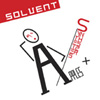 Jason Amm wants me to believe that there is some heart to be found left behind in the 1980s and that it can be transformed and shaped into a potent stew of consistent and modern excellence. I don't believe him entirely. There's plenty of good music to be found on Amm's latest; a few tracks stand head and shoulders above the rest, though, and this makes it an uneven album. The bad that comes with the good is annoyingly bad. The worst tracks are a reminder of how stale and mechanical music can be.
Jason Amm wants me to believe that there is some heart to be found left behind in the 1980s and that it can be transformed and shaped into a potent stew of consistent and modern excellence. I don't believe him entirely. There's plenty of good music to be found on Amm's latest; a few tracks stand head and shoulders above the rest, though, and this makes it an uneven album. The bad that comes with the good is annoyingly bad. The worst tracks are a reminder of how stale and mechanical music can be.
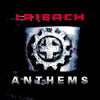 Essentially a formulaic, gimmicky act that only occasionally impresses,Laibach's long career has largely been defined, as well as hindered, bywhat the New York Times once called a "crypto-totalitarianism" thatpervades its work. The project's dubious perceived politics, oftensimultaneously inferred and contradicted by the collective's murkyartistic ethos and unbelievable over-the-top theatrics, injected a doseof controversy into their overblown music, guaranteeing them attentionfrom listeners on both sides of the ideological spectrum. Anthems,a dual disc retrospective of the Slovenian band's two decades of work,chronologically works backwards, beginning with a bouncy, danceableremix of "Das Spiel Ist Aus," the second single off last year'ssurprising and impressive 'WAT' album. Also from that album, "Tanz MitLaibach", arguably the best track ever to come from the band, finallygets the blend of pounding techno and bombastic eurocentricism right,after years of prior attempts with largely sketchy results. Continuingon, forgettable numbers like "Alle Gegen Alle" and "Wirtschaft Ist Tot"set the tone for the overall mediocrity that pervades the rest of thisdisc. "God Is God" indulges in tiresome KMFDM-styled guitar riffs overrepetitive beats and an all-too-familiar male chorus, while the quirkyformer club staple "Geburt Einer Nation" brings back vivid memories ofNew York City goth/industrial nightclubs with its populist march. Ofcourse, a handful of their notorious and downright laughable coversongs (The Beatles' "Get Back" and Europe's "Final Countdown", amongothers) made the cut and those Germanic Cookie Monster vocals that areso undeniably Laibach only intensify just how embarassing these trackstruly are. Fortunately, Laibach sheds some of the hokey stigma whenscales back its excessive use of orchestral elements, as displayed bythe inclusion of earlier tracks such as "Die Liebe" and "Brat Moj". Thesecond disc, comprised of previously available as well as unreleasedremixes of Laibach material, is largely unimpressive, though there area couple of notable exceptions. "Wir Tanzen Ado Hinkel", the ZetaReticula remix of "Tanz Mit Laibach", strips back the intensity of theoriginal, treating the vocals with a robotic-sounding effect and layingdown beats of an equally mechanical quality. Juno Reactor actuallymakes "Final Countdown" remarkably listenable with an invigoratingfloorfiller akin to his mid-nineties material and should certainlyplease anyone familiar with his pre-"Pistolero" work. All in all, Anthemsis a fair, but ultimately unsuccessful, attempt by Mute to hype up andglorify the backcatalog of a largely mediocre, self-indulgent act. Thisnew entry in the probably EMI-influenced pillaging of the Muteindustrial archives of the 1990s fails to meet the mark set by therecent projects set forth for infinitely more worthy acts likeThrobbing Gristle and Cabaret Voltaire.
Essentially a formulaic, gimmicky act that only occasionally impresses,Laibach's long career has largely been defined, as well as hindered, bywhat the New York Times once called a "crypto-totalitarianism" thatpervades its work. The project's dubious perceived politics, oftensimultaneously inferred and contradicted by the collective's murkyartistic ethos and unbelievable over-the-top theatrics, injected a doseof controversy into their overblown music, guaranteeing them attentionfrom listeners on both sides of the ideological spectrum. Anthems,a dual disc retrospective of the Slovenian band's two decades of work,chronologically works backwards, beginning with a bouncy, danceableremix of "Das Spiel Ist Aus," the second single off last year'ssurprising and impressive 'WAT' album. Also from that album, "Tanz MitLaibach", arguably the best track ever to come from the band, finallygets the blend of pounding techno and bombastic eurocentricism right,after years of prior attempts with largely sketchy results. Continuingon, forgettable numbers like "Alle Gegen Alle" and "Wirtschaft Ist Tot"set the tone for the overall mediocrity that pervades the rest of thisdisc. "God Is God" indulges in tiresome KMFDM-styled guitar riffs overrepetitive beats and an all-too-familiar male chorus, while the quirkyformer club staple "Geburt Einer Nation" brings back vivid memories ofNew York City goth/industrial nightclubs with its populist march. Ofcourse, a handful of their notorious and downright laughable coversongs (The Beatles' "Get Back" and Europe's "Final Countdown", amongothers) made the cut and those Germanic Cookie Monster vocals that areso undeniably Laibach only intensify just how embarassing these trackstruly are. Fortunately, Laibach sheds some of the hokey stigma whenscales back its excessive use of orchestral elements, as displayed bythe inclusion of earlier tracks such as "Die Liebe" and "Brat Moj". Thesecond disc, comprised of previously available as well as unreleasedremixes of Laibach material, is largely unimpressive, though there area couple of notable exceptions. "Wir Tanzen Ado Hinkel", the ZetaReticula remix of "Tanz Mit Laibach", strips back the intensity of theoriginal, treating the vocals with a robotic-sounding effect and layingdown beats of an equally mechanical quality. Juno Reactor actuallymakes "Final Countdown" remarkably listenable with an invigoratingfloorfiller akin to his mid-nineties material and should certainlyplease anyone familiar with his pre-"Pistolero" work. All in all, Anthemsis a fair, but ultimately unsuccessful, attempt by Mute to hype up andglorify the backcatalog of a largely mediocre, self-indulgent act. Thisnew entry in the probably EMI-influenced pillaging of the Muteindustrial archives of the 1990s fails to meet the mark set by therecent projects set forth for infinitely more worthy acts likeThrobbing Gristle and Cabaret Voltaire.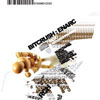 Bitcrush, the latest solo endeavor from Mike Cadoo, takes both themelodic and gritty elements from his prior work in Gridlock and thenow-defunct Dryft and splices them with an urban sensibility. Morecoherant and accessible than anything Cadoo has done previously, Enarcis a logical musical progression that retains a filmic nature whileembracing the notion of traditional song structure. Fans of his workmight find themselves caught off guard by this at first, but theresults are, to quote the soon-to-be-ousted President Bush, superb. Theopening cut "Engale" starts off as expected, with a growing hyponoticdrone peppered with punchy, crunchy percussion. Yet despite the presentfamiliarity, it quickly becomes clear that Bitcrush is not just anotherabstract experimental soundscape act, as the pleasant introduction oftraditional instrumentation on "Untilted" reveals. Moaning with digitalnoise, "Arjon Tenpher" dazzles with dubbed out drum loops and creepingsynthesized melodies. "Habitual" shifts gears from its relativelystraightforward hip hop groove by climaxing with disjointed junglismand an acid teaser lead line. The stunning and irrepressiblyhead-nodding "Eye Koto" blows the roof off the motherfucker with aBristol inspired jam of plucked twangy guitar, huge beats, and DSPmanipulation. "Frebasyc" rocks a Peter Hook-style riff over sharpstuttering drums, with the only missing desired addition being vocals,which apparently will be incorporated into future Bitcrush tracks."Carbon" locks itself in the echo chamber for something somewhatresembling the recent 303-obsessed Wagon Christ album without thekitsch. Conversely, the untitled hidden bonus track does a 180 degreeturn as a straight-up shoegazing indie rock song that could easily windup on college radio station playlists. Standing defiant before theblown out hull of IDM, Enarc is an aurally arresting affairthat stays captivating throughout and raises the bar for Warp noodlers,Ninja Tune wannabes, Planet µ wankers, and the rest of their ilk.
Bitcrush, the latest solo endeavor from Mike Cadoo, takes both themelodic and gritty elements from his prior work in Gridlock and thenow-defunct Dryft and splices them with an urban sensibility. Morecoherant and accessible than anything Cadoo has done previously, Enarcis a logical musical progression that retains a filmic nature whileembracing the notion of traditional song structure. Fans of his workmight find themselves caught off guard by this at first, but theresults are, to quote the soon-to-be-ousted President Bush, superb. Theopening cut "Engale" starts off as expected, with a growing hyponoticdrone peppered with punchy, crunchy percussion. Yet despite the presentfamiliarity, it quickly becomes clear that Bitcrush is not just anotherabstract experimental soundscape act, as the pleasant introduction oftraditional instrumentation on "Untilted" reveals. Moaning with digitalnoise, "Arjon Tenpher" dazzles with dubbed out drum loops and creepingsynthesized melodies. "Habitual" shifts gears from its relativelystraightforward hip hop groove by climaxing with disjointed junglismand an acid teaser lead line. The stunning and irrepressiblyhead-nodding "Eye Koto" blows the roof off the motherfucker with aBristol inspired jam of plucked twangy guitar, huge beats, and DSPmanipulation. "Frebasyc" rocks a Peter Hook-style riff over sharpstuttering drums, with the only missing desired addition being vocals,which apparently will be incorporated into future Bitcrush tracks."Carbon" locks itself in the echo chamber for something somewhatresembling the recent 303-obsessed Wagon Christ album without thekitsch. Conversely, the untitled hidden bonus track does a 180 degreeturn as a straight-up shoegazing indie rock song that could easily windup on college radio station playlists. Standing defiant before theblown out hull of IDM, Enarc is an aurally arresting affairthat stays captivating throughout and raises the bar for Warp noodlers,Ninja Tune wannabes, Planet µ wankers, and the rest of their ilk. 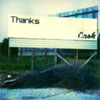 Here at last is a collection of recordings from the 2001 stateside tourof this foursome, all like-minds and prolifics within the vibrantimprov communities of Berlin and Boston. Bhob Rainey and Axel Doernerin particular have emerged as leaders in the extended technique ofbreathy brass playing, where each surface of their horns becomesavailable as an amplified textural playground, as easily hollowed outfor rustling, gaseous overflows as transformed into a turbine ofmagnified industrial clang. Their approach to improvisation means amore acute interaction with the instrument, an inward expansion on thepart of each player that few have been able to jive successfullyagainst the responsibilities of the ensemble setting. Too often theimmaterial (or ultra-material)nature of the style creates barriers between musicians, who are temptedinto layers of colorless ambience or dispassionate exchanges in noise.Even Doerner and Rainey, who maintain astonishing levels of quality inboth solo and group play, sometimes walk into the occasional critiqueof their work as too thin or minimal in its concerns, its dynamics toohidden. These criticisms have no bearing on Thanks, Cash, adisc as sonically dense as anything I've heard from these players, fullof patient, attuned interactions and rich, dark detail. Rainey'sNmperign bandmate Greg Kelley borrows from the bristly, stuntedhalf-blurts of that group's tenser moments, laying down colored accentsand squealing feedback takeovers atop Doerner's closely percussivebreathing exercises and minimal electronic accompaniment. The puretones and static waves of his computer mesh with the ghostlike hover ofAndrea Neumann's innenklavier, producing a painted backdrop ofthrobbing and electric earth tones, a synthetic and darkly greenatmosphere where Rainey's horn hobbles like a wind-tricked door. Hemoves with thrilling impulse from grand, industrial hollows to theclaustrophobic frenzy of spit-soaked insects in the bell of his sax,each sensation delivered with an anticipated and appropriate magnitude.Greater than any one contribution, however, is the ambience of thewhole. The players are less interested in reaction or embellishment aswith a thick textural weave, often achieved as the three horns blend abreathing feedback pattern over Neumann's detached string tangles. Attimes the sound is overpowering and anxious, certainly busier, andtouching harsher extremes than the Nmperign records, but reaching for anew kind of lushness, a forest of electrical fields and buried energy.The four have created a writhing lifeform, nuanced and surprising allat once, and something I can barely imagine witnessing live.
Here at last is a collection of recordings from the 2001 stateside tourof this foursome, all like-minds and prolifics within the vibrantimprov communities of Berlin and Boston. Bhob Rainey and Axel Doernerin particular have emerged as leaders in the extended technique ofbreathy brass playing, where each surface of their horns becomesavailable as an amplified textural playground, as easily hollowed outfor rustling, gaseous overflows as transformed into a turbine ofmagnified industrial clang. Their approach to improvisation means amore acute interaction with the instrument, an inward expansion on thepart of each player that few have been able to jive successfullyagainst the responsibilities of the ensemble setting. Too often theimmaterial (or ultra-material)nature of the style creates barriers between musicians, who are temptedinto layers of colorless ambience or dispassionate exchanges in noise.Even Doerner and Rainey, who maintain astonishing levels of quality inboth solo and group play, sometimes walk into the occasional critiqueof their work as too thin or minimal in its concerns, its dynamics toohidden. These criticisms have no bearing on Thanks, Cash, adisc as sonically dense as anything I've heard from these players, fullof patient, attuned interactions and rich, dark detail. Rainey'sNmperign bandmate Greg Kelley borrows from the bristly, stuntedhalf-blurts of that group's tenser moments, laying down colored accentsand squealing feedback takeovers atop Doerner's closely percussivebreathing exercises and minimal electronic accompaniment. The puretones and static waves of his computer mesh with the ghostlike hover ofAndrea Neumann's innenklavier, producing a painted backdrop ofthrobbing and electric earth tones, a synthetic and darkly greenatmosphere where Rainey's horn hobbles like a wind-tricked door. Hemoves with thrilling impulse from grand, industrial hollows to theclaustrophobic frenzy of spit-soaked insects in the bell of his sax,each sensation delivered with an anticipated and appropriate magnitude.Greater than any one contribution, however, is the ambience of thewhole. The players are less interested in reaction or embellishment aswith a thick textural weave, often achieved as the three horns blend abreathing feedback pattern over Neumann's detached string tangles. Attimes the sound is overpowering and anxious, certainly busier, andtouching harsher extremes than the Nmperign records, but reaching for anew kind of lushness, a forest of electrical fields and buried energy.The four have created a writhing lifeform, nuanced and surprising allat once, and something I can barely imagine witnessing live. The Delgados are done with confrontation and hate at least musically—amodus operandi their last two albums were laden with—and want to showoff a lighter side, concentrating on harmonies and jangly guitars toget the point across and cause the spirits to rise. Universal Audio,then is the Delgados turned firm pop outfit, having fun and enjoyingevery moment, even in the most somber of tempos and dourest of keys.Recorded with Tony Doogan at their own Chem19 studios, these songs arefull of little treats of fancy as Alun Woodward and Emma Pollock tradeoff singing duties and fill it out with whatever strikes their fancy.Starting off is what may sound like fighting words drowned in brightguitars, but is actually a question of faith and what gets people intotheir situations. A little keys touch the point, and then the heavydrums return with perfect syncopation. At the chorus the song takesflight, and then the next verse takes it towards the sun, withdistorted madness accompanying a secondary vocal, harmonies, and therest of the instruments. Suddenly it's the indie rock wall-of-sound,though with the same intent of warming up the entire world with alittle bit of sunshine through a thick and layered pop sound. Eventhough the lyrics seem full of questions or self doubt, the band soundsas confident as ever in this sugar sweet head bob of a joy parade,until the fourth track, "Come Undone," a piano-led dirge with Pollock'smost plaintive and gorgeous vocal wailing "this is how it feels todrown, this is how we come undone." Brave and unrelenting, the albumcontinues, the songs an adventurous and captivating walk on new ground,the kind of record the Delgados have been threatening to make for along time with only one song crossing the five minute mark. There areno missteps or faltering moments to be found, no paltry fallacies orfacades of indie cred. It's just one solid block of good music with thebest of intentions. Others may talk of how it rates with the rest oftheir catalog, but it just plain doesn't. It transcends it all, andthough I may miss the direct assault of other records, this one doesthe trick just fine.
The Delgados are done with confrontation and hate at least musically—amodus operandi their last two albums were laden with—and want to showoff a lighter side, concentrating on harmonies and jangly guitars toget the point across and cause the spirits to rise. Universal Audio,then is the Delgados turned firm pop outfit, having fun and enjoyingevery moment, even in the most somber of tempos and dourest of keys.Recorded with Tony Doogan at their own Chem19 studios, these songs arefull of little treats of fancy as Alun Woodward and Emma Pollock tradeoff singing duties and fill it out with whatever strikes their fancy.Starting off is what may sound like fighting words drowned in brightguitars, but is actually a question of faith and what gets people intotheir situations. A little keys touch the point, and then the heavydrums return with perfect syncopation. At the chorus the song takesflight, and then the next verse takes it towards the sun, withdistorted madness accompanying a secondary vocal, harmonies, and therest of the instruments. Suddenly it's the indie rock wall-of-sound,though with the same intent of warming up the entire world with alittle bit of sunshine through a thick and layered pop sound. Eventhough the lyrics seem full of questions or self doubt, the band soundsas confident as ever in this sugar sweet head bob of a joy parade,until the fourth track, "Come Undone," a piano-led dirge with Pollock'smost plaintive and gorgeous vocal wailing "this is how it feels todrown, this is how we come undone." Brave and unrelenting, the albumcontinues, the songs an adventurous and captivating walk on new ground,the kind of record the Delgados have been threatening to make for along time with only one song crossing the five minute mark. There areno missteps or faltering moments to be found, no paltry fallacies orfacades of indie cred. It's just one solid block of good music with thebest of intentions. Others may talk of how it rates with the rest oftheir catalog, but it just plain doesn't. It transcends it all, andthough I may miss the direct assault of other records, this one doesthe trick just fine.  One of several definitions of the word "pooka" is "a shape shiftingmagical being from Celtic folklore." It's somewhat a fitting title forJaga Jazzist member Lars Horntveth's debut solo recording, seeing asdefining his style of music would be difficult. Pooka'sstrong compositions draw from the cinematic to jazz to modernclassical, all with the underpinning of electronic-based elements and,at times, a slight edge. Employing a prominent and lush string section,Horntveth's intricate and challenging charts provide quite the workout,rather than just having them playing "eggs" to color in the spacesaround his performances on bass clarinet, saxophones, guitars and ahost of other instruments. For his twenty-four years in age, it'smind-blowing to hear such strong musicianship on a plethora ofinstruments paired with the maturity of his compositions, delicatearrangements and orchestration; or at any age, for that matter. Afterrepeated and very enjoyable listenings (my four-year-old asking it beplayed in the car), it only became apparent when taking more of acritical approach in preparing to review this disc that Horntveth may,at times, have a formula for changing keys when he's got a trulyamazing motif playing out. Yup, that's truly the only offending elementI could find. The more upbeat and driving tracks, such as "The Joker"and "1. Lesson In Violin" rely more on the poppy, electronic side ofthings and less on the backing orchestra; the syncopation of the lattertrack having Jaga Jazzist written all over it. Then again, with themajority of their tunes either written or co-written by Horntveth,comparisons and similarities are inevitable. The greatest track thisyear, "Tics" builds from plucked strings and minimal glitch beatsunderneath haunting soprano saxophone to a grandiose chorus of odd timesignature strings playing out an intricately woven, middle-Easterntinged melody. Having witnessed Horntveth's musical abilitiesfirst-hand and enjoyed his solo recording several times over, he is amusical genius-in-waiting and an important modern composer of his orany other generation.
One of several definitions of the word "pooka" is "a shape shiftingmagical being from Celtic folklore." It's somewhat a fitting title forJaga Jazzist member Lars Horntveth's debut solo recording, seeing asdefining his style of music would be difficult. Pooka'sstrong compositions draw from the cinematic to jazz to modernclassical, all with the underpinning of electronic-based elements and,at times, a slight edge. Employing a prominent and lush string section,Horntveth's intricate and challenging charts provide quite the workout,rather than just having them playing "eggs" to color in the spacesaround his performances on bass clarinet, saxophones, guitars and ahost of other instruments. For his twenty-four years in age, it'smind-blowing to hear such strong musicianship on a plethora ofinstruments paired with the maturity of his compositions, delicatearrangements and orchestration; or at any age, for that matter. Afterrepeated and very enjoyable listenings (my four-year-old asking it beplayed in the car), it only became apparent when taking more of acritical approach in preparing to review this disc that Horntveth may,at times, have a formula for changing keys when he's got a trulyamazing motif playing out. Yup, that's truly the only offending elementI could find. The more upbeat and driving tracks, such as "The Joker"and "1. Lesson In Violin" rely more on the poppy, electronic side ofthings and less on the backing orchestra; the syncopation of the lattertrack having Jaga Jazzist written all over it. Then again, with themajority of their tunes either written or co-written by Horntveth,comparisons and similarities are inevitable. The greatest track thisyear, "Tics" builds from plucked strings and minimal glitch beatsunderneath haunting soprano saxophone to a grandiose chorus of odd timesignature strings playing out an intricately woven, middle-Easterntinged melody. Having witnessed Horntveth's musical abilitiesfirst-hand and enjoyed his solo recording several times over, he is amusical genius-in-waiting and an important modern composer of his orany other generation.  While Dizzee Rascal has been grabbing all the attention on these andhis home shores, another act and acquaintance of his has been waitingpatiently in the wings, ready to unleash his sound on the masses. Wileyhas finally arrived on the scene, though it seems almost like he's cometo the party late, when the UK underground scene already feels ancientand waning. With Mike Skinner getting his lauds and Dizzee pulling therest of the fans, it hardly seems like there's room for Wiley unlesshe's got something original to push. Luckily, he does have that, andenough creative subject matter to keep the ears glued to the speakersand the feet on the dancefloor. Wiley and Dizzee were both members ofthe Roll Deep Crew — both even throw shout outs to them on theirrecords — so like influence produces like stylings; though where thelatter is after the minds and hearts, the former is definitely afterthe rumps and booties. Wiley is a producer, not just a rapper, and hisproduction values are excellent, with clean bass, beats, little or nosamples, and double-tracked vocals with echoes and repeats in oddtones. Plus, his delivery is a bit clearer, making him easier tounderstand through the cockney slant, which also makes him a bit morelikeable. It's to be expected that rhymes will be about the same oldschtick that street hoods chat about, but Wiley's got another messageabout making things work, working through the problems, and succeedingon one's own steam. He raps and speaks with a super smooth flow, andeven when he tells the tale about pies that are missing it doesn'tsound ridiculous, just a regular occurrence in his world. That'sperhaps the most glaring trait that makes Wiley excel: he doesn't takehimself too seriously, willing to joke and jar but do it all with thesame skill and respect as his more driven material. There are guestrappers that add some variety and camaraderie, and some interludes thatare pleasant enough but would have been so much better if he'dcompleted them as finished tracks or integrated them more. If there's amedal to give for this game these days, though, I'd give it to this catover the others. He's obviously put the work in, the years in, takensome hits here and there, but his sound is all his and ultra-original,ready to take on the world or help it along if needs be.
While Dizzee Rascal has been grabbing all the attention on these andhis home shores, another act and acquaintance of his has been waitingpatiently in the wings, ready to unleash his sound on the masses. Wileyhas finally arrived on the scene, though it seems almost like he's cometo the party late, when the UK underground scene already feels ancientand waning. With Mike Skinner getting his lauds and Dizzee pulling therest of the fans, it hardly seems like there's room for Wiley unlesshe's got something original to push. Luckily, he does have that, andenough creative subject matter to keep the ears glued to the speakersand the feet on the dancefloor. Wiley and Dizzee were both members ofthe Roll Deep Crew — both even throw shout outs to them on theirrecords — so like influence produces like stylings; though where thelatter is after the minds and hearts, the former is definitely afterthe rumps and booties. Wiley is a producer, not just a rapper, and hisproduction values are excellent, with clean bass, beats, little or nosamples, and double-tracked vocals with echoes and repeats in oddtones. Plus, his delivery is a bit clearer, making him easier tounderstand through the cockney slant, which also makes him a bit morelikeable. It's to be expected that rhymes will be about the same oldschtick that street hoods chat about, but Wiley's got another messageabout making things work, working through the problems, and succeedingon one's own steam. He raps and speaks with a super smooth flow, andeven when he tells the tale about pies that are missing it doesn'tsound ridiculous, just a regular occurrence in his world. That'sperhaps the most glaring trait that makes Wiley excel: he doesn't takehimself too seriously, willing to joke and jar but do it all with thesame skill and respect as his more driven material. There are guestrappers that add some variety and camaraderie, and some interludes thatare pleasant enough but would have been so much better if he'dcompleted them as finished tracks or integrated them more. If there's amedal to give for this game these days, though, I'd give it to this catover the others. He's obviously put the work in, the years in, takensome hits here and there, but his sound is all his and ultra-original,ready to take on the world or help it along if needs be.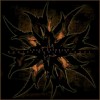 While the land of their Scandinavian contemporaries slowly creepstowards weeks of complete and unrelenting natural darkness, Britain'sAnaal Nathrakh seem set to unleash a similar fate upon the world withthe release of their second full length. Picking up right where theyleft off 3 years ago with their wildly successful and criticallyacclaimed debut, The Codex Necro, the duo bring more of what they havetermed to be "the soundtrack for armageddon, the [audile] essence ofevil, hatred and violence, the true spirit of necro taken to itsmusical extremes." While obviously this is typical black metalhyperbole, they've historically done a pretty solid job of backing itup with their cold, mechanistic precision and merciless velocity.However, Domine Non Es Dignus, as shocking as it may be, sees themprogressing beyond classic "grim" schlock and entering a territorywhere they can truly do some damage. An immediately noticeabledeparture from their previous work is the inclusion of cleanly sung,mildly operatic vocals that bring immediate and unavoidable comparisonsto Garm's late Ulver/early Borknagar work. While this aspect of theirsound is still in its formative stages and is used sparingly, it showspromise. Nowhere is this more evident than the album's standout track,"Do Not Speak," on which vocalist V.I.T.R.I.O.L. ascends, albeit foronly a short time, above the catchy breakneck guitar harmonies for asurprising and, hopefully, revealing glimpse at what is to come.Compare that to "Procreation of the Wretched" in all of its howling,noisy, and all-around old-school glory, and you'll get a pretty goodidea of the astounding range these guys are capable of covering in thecourse of ten short songs. They even take a stab at death metaldynamics with the relatively slow groove of "This is the End," anotherforward thinking gem on an album not lacking novel ideas and more thanadequate execution.
While the land of their Scandinavian contemporaries slowly creepstowards weeks of complete and unrelenting natural darkness, Britain'sAnaal Nathrakh seem set to unleash a similar fate upon the world withthe release of their second full length. Picking up right where theyleft off 3 years ago with their wildly successful and criticallyacclaimed debut, The Codex Necro, the duo bring more of what they havetermed to be "the soundtrack for armageddon, the [audile] essence ofevil, hatred and violence, the true spirit of necro taken to itsmusical extremes." While obviously this is typical black metalhyperbole, they've historically done a pretty solid job of backing itup with their cold, mechanistic precision and merciless velocity.However, Domine Non Es Dignus, as shocking as it may be, sees themprogressing beyond classic "grim" schlock and entering a territorywhere they can truly do some damage. An immediately noticeabledeparture from their previous work is the inclusion of cleanly sung,mildly operatic vocals that bring immediate and unavoidable comparisonsto Garm's late Ulver/early Borknagar work. While this aspect of theirsound is still in its formative stages and is used sparingly, it showspromise. Nowhere is this more evident than the album's standout track,"Do Not Speak," on which vocalist V.I.T.R.I.O.L. ascends, albeit foronly a short time, above the catchy breakneck guitar harmonies for asurprising and, hopefully, revealing glimpse at what is to come.Compare that to "Procreation of the Wretched" in all of its howling,noisy, and all-around old-school glory, and you'll get a pretty goodidea of the astounding range these guys are capable of covering in thecourse of ten short songs. They even take a stab at death metaldynamics with the relatively slow groove of "This is the End," anotherforward thinking gem on an album not lacking novel ideas and more thanadequate execution. 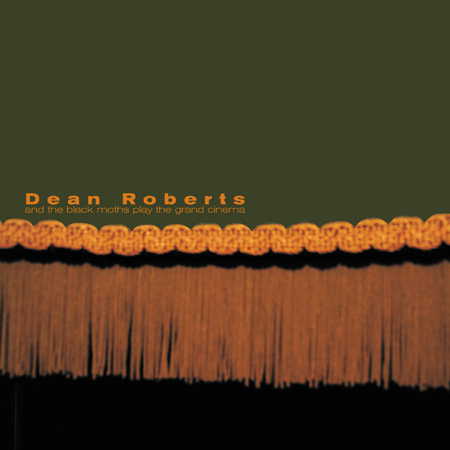 As the dust of Mille Plateaux's collapse settles, it's easy to forgetabout the number of great releases from the label's more experimentaloff-shoot Ritornell that will also be lost. And though I'm not surethat Staubgold is game for a larger reissue series of that label's lostgems, they have certainly chosen one of the best for this singlerepress, complete with redone artwork. Black Moths was Roberts' last "solo" record before 2003's beautiful Be Mine Tonight. It was recorded shortly after a couple rather computer-centric discs (All Cracked Medias and Moth Park)which found Roberts exploring his usual set-up of prepared guitar,hi-hat-heavy percussion, and plunked piano to alienating extremes,instruments deftly chopped and pasted into mock mini-explosions, acoalescence of chiming, shredded sound bits with instrumentalidentities and roles filled only at a bare minimum and movements withina piece arriving in anxious, feigned, and too-often meaninglesssuccession. The "meta-language" Roberts describes himself as creatingon these releases, while unique, can also be frustrating as it providesno easy information about the direction of a particular piece. Often asong's entire progression consists of repetitious, segmented bursts inwhich the interaction and improvisation of the instruments are boxedwithin simple, stunted meditations on a single tonal or textural idea.Roberts' smoky, even ragged playing style, steeped in years of droningimprov with his first group Thela, seems an immediate signifier oflonely and fragile territories, but the religious structuring of theseearlier releases makes for a bizarre conflict of interest as anytangible mood is erased by the calculated and incessant playings off-ofor into a cryptic formal diagram. For Black Moths, Roberts has notgiven up on the high-concept of his early works; rather, he chooses toup the ante by forcing more elements of traditional rock or"song"-styled composition into his already idea-heavy mix. The "BlackMoths," consisting of Matt Valentine, Tim Barnes (of Tower Recordings)and cellist Charles Curtis are not a support band assembled toindulge any new-found sweetness in Roberts' sensibility. They appear asif in the imagined realm of the Spiders from Mars, brought together atRoberts' whim to carry his ideas into rock (or at least free-folk)parody. The "grand cinema" of the title puts the players on stage,weaving rock moves into the reams of static glitch, cello groan, andbillowing guitar squall that unfold out and out, in increasinglyforeign structure over the 40 minutes. Roberts sings over a few of thetrack divisions (marking only pauses along a solid body of shifting andcycling sounds), one time breaking desperately into Eno's "Cindy TellsMe," another bursting with the glammy refrain, "How they adoooore you!"Barnes' percussion and Valentine's bass manage also to sound almostmanic, amazing given the album's formal restraints, which struggle toguide everything toward a sprawling digital submergence where "natural"cracks and pauses are prematurely filled, and new, unsuspected gapsopened. Black Moth's theatrical component does little more thanadd another layer to Roberts' unique sonic amalgam, but it is enough tomake this disc one of his most accessible and most complex, preparingwell for Be Mine Tonight where the artist's bizarrecompositional structures find just the right counterpoint in fragilesong-craft and production detailed enough to make the music sound trulyotherworldly.
As the dust of Mille Plateaux's collapse settles, it's easy to forgetabout the number of great releases from the label's more experimentaloff-shoot Ritornell that will also be lost. And though I'm not surethat Staubgold is game for a larger reissue series of that label's lostgems, they have certainly chosen one of the best for this singlerepress, complete with redone artwork. Black Moths was Roberts' last "solo" record before 2003's beautiful Be Mine Tonight. It was recorded shortly after a couple rather computer-centric discs (All Cracked Medias and Moth Park)which found Roberts exploring his usual set-up of prepared guitar,hi-hat-heavy percussion, and plunked piano to alienating extremes,instruments deftly chopped and pasted into mock mini-explosions, acoalescence of chiming, shredded sound bits with instrumentalidentities and roles filled only at a bare minimum and movements withina piece arriving in anxious, feigned, and too-often meaninglesssuccession. The "meta-language" Roberts describes himself as creatingon these releases, while unique, can also be frustrating as it providesno easy information about the direction of a particular piece. Often asong's entire progression consists of repetitious, segmented bursts inwhich the interaction and improvisation of the instruments are boxedwithin simple, stunted meditations on a single tonal or textural idea.Roberts' smoky, even ragged playing style, steeped in years of droningimprov with his first group Thela, seems an immediate signifier oflonely and fragile territories, but the religious structuring of theseearlier releases makes for a bizarre conflict of interest as anytangible mood is erased by the calculated and incessant playings off-ofor into a cryptic formal diagram. For Black Moths, Roberts has notgiven up on the high-concept of his early works; rather, he chooses toup the ante by forcing more elements of traditional rock or"song"-styled composition into his already idea-heavy mix. The "BlackMoths," consisting of Matt Valentine, Tim Barnes (of Tower Recordings)and cellist Charles Curtis are not a support band assembled toindulge any new-found sweetness in Roberts' sensibility. They appear asif in the imagined realm of the Spiders from Mars, brought together atRoberts' whim to carry his ideas into rock (or at least free-folk)parody. The "grand cinema" of the title puts the players on stage,weaving rock moves into the reams of static glitch, cello groan, andbillowing guitar squall that unfold out and out, in increasinglyforeign structure over the 40 minutes. Roberts sings over a few of thetrack divisions (marking only pauses along a solid body of shifting andcycling sounds), one time breaking desperately into Eno's "Cindy TellsMe," another bursting with the glammy refrain, "How they adoooore you!"Barnes' percussion and Valentine's bass manage also to sound almostmanic, amazing given the album's formal restraints, which struggle toguide everything toward a sprawling digital submergence where "natural"cracks and pauses are prematurely filled, and new, unsuspected gapsopened. Black Moth's theatrical component does little more thanadd another layer to Roberts' unique sonic amalgam, but it is enough tomake this disc one of his most accessible and most complex, preparingwell for Be Mine Tonight where the artist's bizarrecompositional structures find just the right counterpoint in fragilesong-craft and production detailed enough to make the music sound trulyotherworldly.  From the newly formed label, Reduced Phat, comes this anti-compilation,various artists release that announces the label's intent with gusto. Isay "anti-compilation" because unlike most label comps that throw ineverything that's passable that washes up on their shores, the ReducedPhat manifesto calls for paying attention only to the very cream of thecrop of possible artists and releases that are all struggling to beheard. Featuring two tracks and two remixes a piece from Enduser,Edgey, and Subsektor, the disc feels more like a fun exchange between aVIP group of like-minded artists than a collection of random anddisconnected tracks from whomever happens to be out there. Startingwith Enduser's unabashed homage to Lush, 2%quickly kicks into high gear and doesn't relent for five and a halftracks until a break in Edgey's "Indigna" calms things down for laughs.Enduser brings his road-tested production to the mix with his twosplintered originals and remixes for his partners that eviscerate andthen reconstruct their grooves with demented jungle abandon. Subsektoroffers up the most straightforward take on hard drum n bass, but histracks are no less confrontational. Edgey's superb reworking of "DeathVest" into a hard stomping mid-tempo piece is probably my favoritetrack, but Enduser's treatment of Subsektor's "The Breed" is equallyfun and shows once again why Enduser is the master at mashed up drum nbass madness. Clocking in at just over an hour for 12 tracks, 2%provides all the essential breaks and bass without cluttering the mixwith disposable or throw-away tracks. Edgey brings the weirdness,Enduser fractures the beats, and Subsektor provides the hooks and itall works without ever sounding like too much. As much as I liked the Carboncompilation that approached breakbeat music with a similar sensibility,this record feels more coherent and less kitchen sink. Whenever a newlabel jumps into the game of releasing records into a market that isincreasingly unfriendly to physical CDs and untested products andbrands, I get a little nervous. When the releases are as good as thisone though, I can only hope enough people take notice to make theenterprise the success it deserves to be.
From the newly formed label, Reduced Phat, comes this anti-compilation,various artists release that announces the label's intent with gusto. Isay "anti-compilation" because unlike most label comps that throw ineverything that's passable that washes up on their shores, the ReducedPhat manifesto calls for paying attention only to the very cream of thecrop of possible artists and releases that are all struggling to beheard. Featuring two tracks and two remixes a piece from Enduser,Edgey, and Subsektor, the disc feels more like a fun exchange between aVIP group of like-minded artists than a collection of random anddisconnected tracks from whomever happens to be out there. Startingwith Enduser's unabashed homage to Lush, 2%quickly kicks into high gear and doesn't relent for five and a halftracks until a break in Edgey's "Indigna" calms things down for laughs.Enduser brings his road-tested production to the mix with his twosplintered originals and remixes for his partners that eviscerate andthen reconstruct their grooves with demented jungle abandon. Subsektoroffers up the most straightforward take on hard drum n bass, but histracks are no less confrontational. Edgey's superb reworking of "DeathVest" into a hard stomping mid-tempo piece is probably my favoritetrack, but Enduser's treatment of Subsektor's "The Breed" is equallyfun and shows once again why Enduser is the master at mashed up drum nbass madness. Clocking in at just over an hour for 12 tracks, 2%provides all the essential breaks and bass without cluttering the mixwith disposable or throw-away tracks. Edgey brings the weirdness,Enduser fractures the beats, and Subsektor provides the hooks and itall works without ever sounding like too much. As much as I liked the Carboncompilation that approached breakbeat music with a similar sensibility,this record feels more coherent and less kitchen sink. Whenever a newlabel jumps into the game of releasing records into a market that isincreasingly unfriendly to physical CDs and untested products andbrands, I get a little nervous. When the releases are as good as thisone though, I can only hope enough people take notice to make theenterprise the success it deserves to be.- Enduser - Death Vest
- Subsektor - The Breed
- Edgey - Indigina
 The last thing the world needs now is another avant-leaning Japanese psychedelic rock band, especially one with a name as silly and long-winded as Green Milk From the Planet Orange. Their name, besides being a serious impediment to success, sounds like it could be an unpublished manuscript by Dr. Seuss, one of those later works his editor refused to publish because it contained overt drug references. The album is called He's Crying "Look," a cruel juvenile chant which dredged up a whole reservoir of buried childhood trauma that I'd rather not go into right now.
The last thing the world needs now is another avant-leaning Japanese psychedelic rock band, especially one with a name as silly and long-winded as Green Milk From the Planet Orange. Their name, besides being a serious impediment to success, sounds like it could be an unpublished manuscript by Dr. Seuss, one of those later works his editor refused to publish because it contained overt drug references. The album is called He's Crying "Look," a cruel juvenile chant which dredged up a whole reservoir of buried childhood trauma that I'd rather not go into right now.
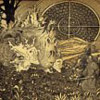 This is the debut full-length album for Whitelodge, a trio ensconced deep in Florida's panhandle, an area known for mosquitoes, extreme humidity and torrential rains, an area recently attacked by a series of forceful hurricanes. These extremes of nature seem to have exerted an influence on Whitelodge's music, moving as it does through seasonal movements: the hazy, psychedelic buzzing of summer insects, the golden autumnal harvest, the skeletal frost of winter; and the rebirth of pastoral springtime.
This is the debut full-length album for Whitelodge, a trio ensconced deep in Florida's panhandle, an area known for mosquitoes, extreme humidity and torrential rains, an area recently attacked by a series of forceful hurricanes. These extremes of nature seem to have exerted an influence on Whitelodge's music, moving as it does through seasonal movements: the hazy, psychedelic buzzing of summer insects, the golden autumnal harvest, the skeletal frost of winter; and the rebirth of pastoral springtime.



